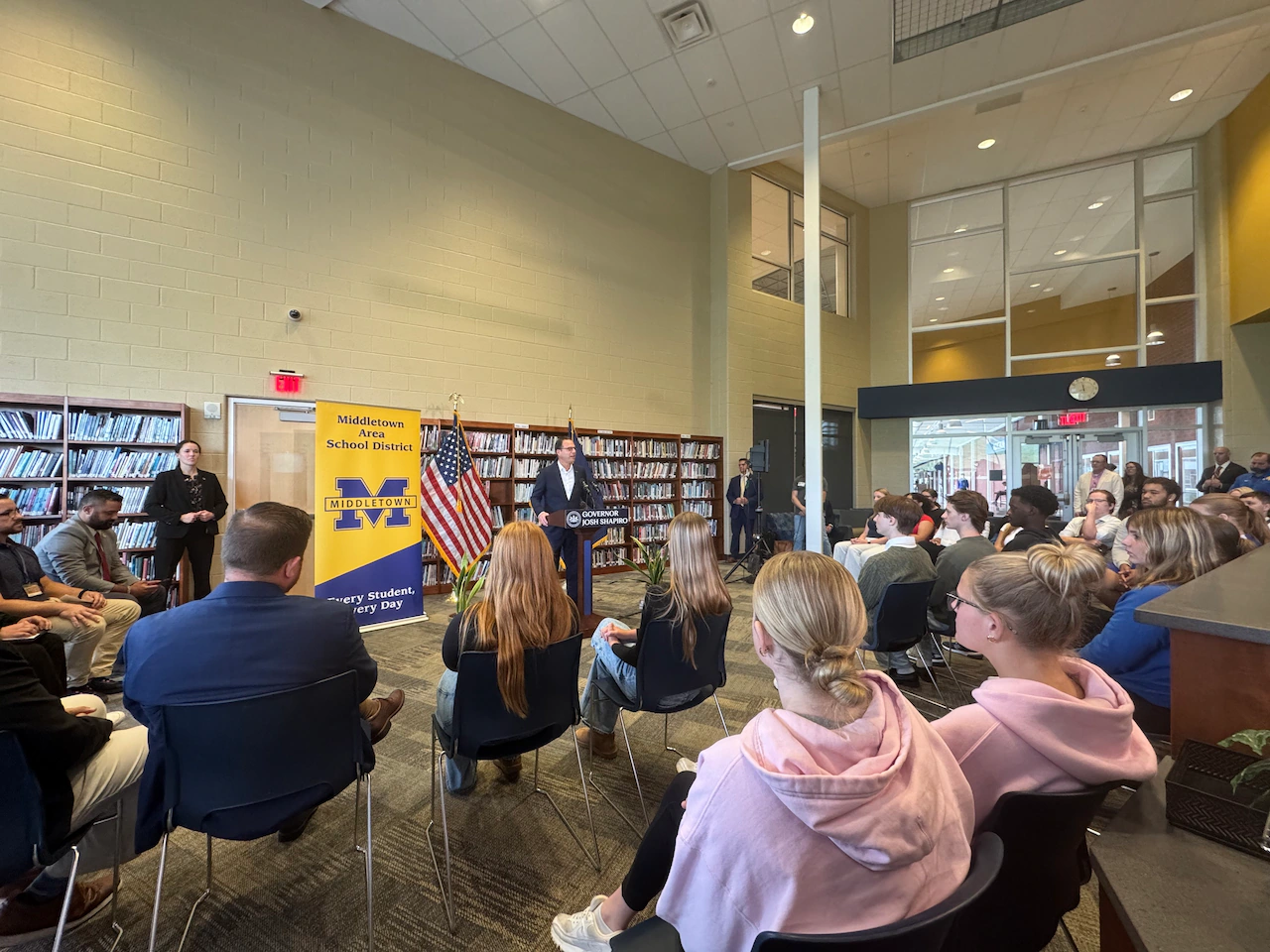
The rise of social media use is not surprising. But the playing field has grown more complicated with the spread of artificial intelligence. The Trump administration has leaned heavily on social media, and at times AI to announce policy changes in unprecedented ways.
The latest example came in a racist tweet from President Donald Trump. Just hours after meeting with Senate and House minority leaders to discuss the looming federal shutdown, Trump shared what appeared to be an AI-generated video of U.S. Rep. Hakeem Jeffries wearing a mustache and sombrero with a fake voiceover from U.S. Sen. Chuck Schumer.
At a Tuesday press conference in Middletown Area High School, Gov. Josh Shapiro pointed to the incident as a reminder of the importance of media literacy. He also highlighted a toolkit his administration rolled out last year to help teachers and students evaluate what they see online. He said it’s “not to teach you what to think, but how to help you to discern fact from fiction.”
“You would think the President would speak the truth every day,” Shapiro said, referring to his recent AI post. “That was obviously an extreme example of him not speaking the truth but it’s an example of how these AI generated images are all around us every day.”
A 2021 Penn State study found that 84% of U.S. teens use social media. Research has repeatedly linked heavy social media use to declining mental health among young people. Another study found that over 95 percent of governments worldwide also use social media to some extent.
At Tuesday’s press conference, some student attendees said they already feel the challenges of navigating an online world where AI and real life blend together. Four students help produce a daily five-minute segment on their school’s current events.
“Every day I look online, I see generative AI content getting more advanced,” said 17-year-old Cooper Johnson.
“Common tells of AI are just getting hard and harder to detect,” added 17-year-old Jacob Shott.
Another concern around social media is how algorithms create echo chambers and feedback loops, by design. Shapiro partly blamed social media companies, saying he has “spoken to a number of the executives who run the companies” but can only “urge them to change their approach.”
When asked about a potential statewide phone policy, Shapiro said he preferred to leave the decision to individual schools.
“But we want them to use the phones in a way that can be constructive and productive and teach them how to do that,” Shapiro said.
There is no national mandate for media literacy education in schools. Some states mandate it, but Pennsylvania has not. Acting Secretary of Education, Dr. Carrie Rowe, acknowledged that media literacy “is no longer optional, but really essential.”
She said the state’s information toolkit has sample lesson plans, checklists for students to evaluate source credibility, guides and online modules for teachers, administrators and students.
Other attendees — all Democrats — included Sen. Patty Kim and Rep. Justin Fleming of Dauphin County, Rep. Nate Davidson of Cumberland County and Rep. Dave Madsen of Dauphin County, a Middletown Area High School alum. Davidson said the need for media literacy feels personal.
“The Internet’s a scary place right now, but when I’m thinking and looking ahead for where my kids are going to be, I’m really looking for this kind of leadership in this space,” Davidson said.
Shapiro said the ongoing budget impasse will not affect the development of the toolkit. He added that a budget deal is “incredibly close” but gave no timeline for when it might be completed.
“I can sign it; I can propose it. I can’t vote on it,” Shapiro said, placing blame on the Senate for the delay, something he has repeated in recent months.
“Show up for work, do your job,” Shapiro said. “Your one job is to pass a budget. Pass it.”



